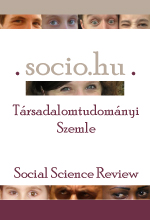A francia családszociológia és a későmodernitás identitás-diskurzusa
Identity discourse of French family sociology and late modernity
Author(s): Erzsébet TakácsSubject(s): Social Sciences
Published by: MTA TK Szociológiai Intézet
Keywords: family sociology; French; late modernity; youth culture; identity
Summary/Abstract: There are a lot of analogies between the French theoretical writings of current family sociology and the other branches of social science. All of them have to face the lack of general theories of (family) sociology, the fitting of macro and micro levels and the question about complementarities in quantitative and qualitative research. But family sociology has the peculiarity that its proper object is used to being a frequent example for other social disciplines. The family has become the privileged space to investigate both personal identity and social changes – probably this is the main reason for reflourishing of family sociology. A French particularity is that the problem of late modernity is investigated from the point of view of specific fields (primarily youth, education and family), and researchers repeatedly came to the conclusion that they had to resort to an outdated and insufficient theoretical background and terminological apparatus to describe the current social processes. Therefore social scientists of the so-called ‘individual sociology’ elaborated various medium-level theories and methodologies in order to understand and describe social processes of late modernity. In the following I’m going to review the work of two decisive members (Jean-Claude Kaufmann, François de Singly) of that school and some family and youth sociology researches focused of the identity.
Journal: Socio.hu Társadalomtudományi Szemle
- Issue Year: 3/2013
- Issue No: 3
- Page Range: 45-57
- Page Count: 13
- Language: Hungarian

